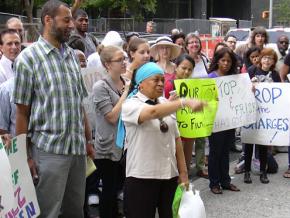Rallying behind Jazz Hayden
reports on the latest mobilization in solidarity with Jazz Hayden.
SOME 100 people rallied July 31 at the Manhattan Criminal Court Building to support Joseph "Jazz" Hayden, an opponent of police brutality and racial profiling in New York City, during his court appearance on charges stemming from the NYPD's campaign of harassment against him.
More than double the number of people came out compared to Jazz's last hearing. They stood right in front of the entrance to the court building, and speakers used the people's mic to denounce police racism, stop-and-frisk and retaliatory charges.
Activists believe the New York Police Department (NYPD) is retaliating against Jazz for his years of videotaping police stops in Harlem in order to expose racism and misconduct. In December 2011, two police officers recognized Jazz, illegally searched his car, and arrested him--he was charged with two counts of felony possession of a dangerous weapon.
The "dangerous weapons" were a penknife and a commemorative mini-replica baseball bat. Jazz faces two to seven years in prison for each charge. Jazz spelled out the situation clearly and simply:

If the NYPD was providing courtesy, professionalism and respect, as they claim is their mission, they would have no objection to Jazz Hayden filming them. However, because we've had over 700,000 stop-and-frisks, and only 6 percent of them resulted in anything resembling a crime, they need to be scrutinized. And that's what Jazz Hayden does.
AT THE protest last week, David Galarza of the Justice Committee explained the importance of videotaping police. He did this in mid-July and caught a police officer on tape abusing and then body-slamming--twice--a young man of color. Because of his video, more than 150,000 people have seen this brutality.
This is what Jazz has been doing for four years, and this is what the NYPD wants to stop. "This is the pushback," Jazz said. "Retaliation--silence the people who stand up. Well, we want to send a message to the NYPD, to [Police Commissioner Ray] Kelly, and [Mayor Michael] Bloomberg. We aren't having it."
More than half a dozen people delivered passionate speeches about the injustice of this bogus case against Jazz and other trumped-up allegations meant to silence freedom fighters like Brother Shep, Malik Ayala and Shaka Shakur.
Brother Shep's case is still before the justice system, but the outcome of the charges against Malik Ayala and Shaka Shakur are prime examples of the power we have to win justice when we unite and organize. Both cases were dropped because of pressure from rallies and press conferences, and packing the courthouses with supporters.
We packed Jazz's court hearing on July 31, too. To show our solidarity, when the judge called Jazz's name, we all stood up. We sat down when asked, but the point was made: an injury to one is an injury to all. We will not let the NYPD and the district attorney (DA) lock Jazz up for his work under any circumstances. The hearing ended quickly. The judge simply set another court date for October 11.
Outside, we reassembled and Jazz's lawyer, Sarah Kunstler, updated the crowd on the legal proceedings. The DA intends to indict Jazz before the October 11 date and will most likely convene a grand jury in September to do so. We have to come out in full force on both days. Then she added:
I talked about the legal, and now I want to talk about the extra-legal. They took notice of us there. The judge saw you, the DA saw you, everyone in that courtroom saw you, and it makes a difference. All the advocacy that everyone has done outside the courtroom for Jazz makes a difference.
Clearly, when we are big enough and organized enough, the courts respond to public pressure. In this case, Jazz and his supporters are petitioning the courts not to prosecute, and it's having an effect. Jazz's supporters have collected over 1,600 signatures, sent dozens of personal letters to DA Cyrus Vance, and garnered support and letters from elected officials. This has kept the DA's office talking about Jazz's case.
It has also kept the DA's office in the spotlight for its role in this injustice--if Jazz is indicted, it will completely disprove Vance's claim that "when it comes to us, we are not making charges that are biased in any way."
Sarah Kunstler explained the real motivation behind the charges, "This is the way the system derails movements--by putting people on trial to distract from the work that we're all doing. So we have to spin this on its head, and make these prosecutions part of the work we're all doing."
That's what Jazz's defense campaign has done. Because it's not just Jazz being targeted by biased charges. It's not even just Malik and Brother Shep and other activists. It's a whole generation of people of color who the courts are calling criminals and locking up in cages.
Even as he faces these charges, Jazz is organizing. The Campaign to End the New Jim Crow, of which Jazz is a founding member, drafted a flyer to distribute to the people waiting in line at the court. In a call for an August 11 public meeting, the group said: "The lines going into every courthouse in America look exactly like this one you are standing in: black, brown and beige people being processed by this criminal in-justice system."
Jazz ended the rally by saying:
Once again, I want to thank y'all. I'm telling you I've never felt so much love and so much warmth. It's just mind-boggling, for someone who was brought up in the streets of Harlem and has gone through this system all my life, starting with kindergarten, to be able to stand here and be surrounded by all this love and support is a wonderful thing. I want you all to know that I do not take any of it lightly. I will do this job as long as I have your support.


